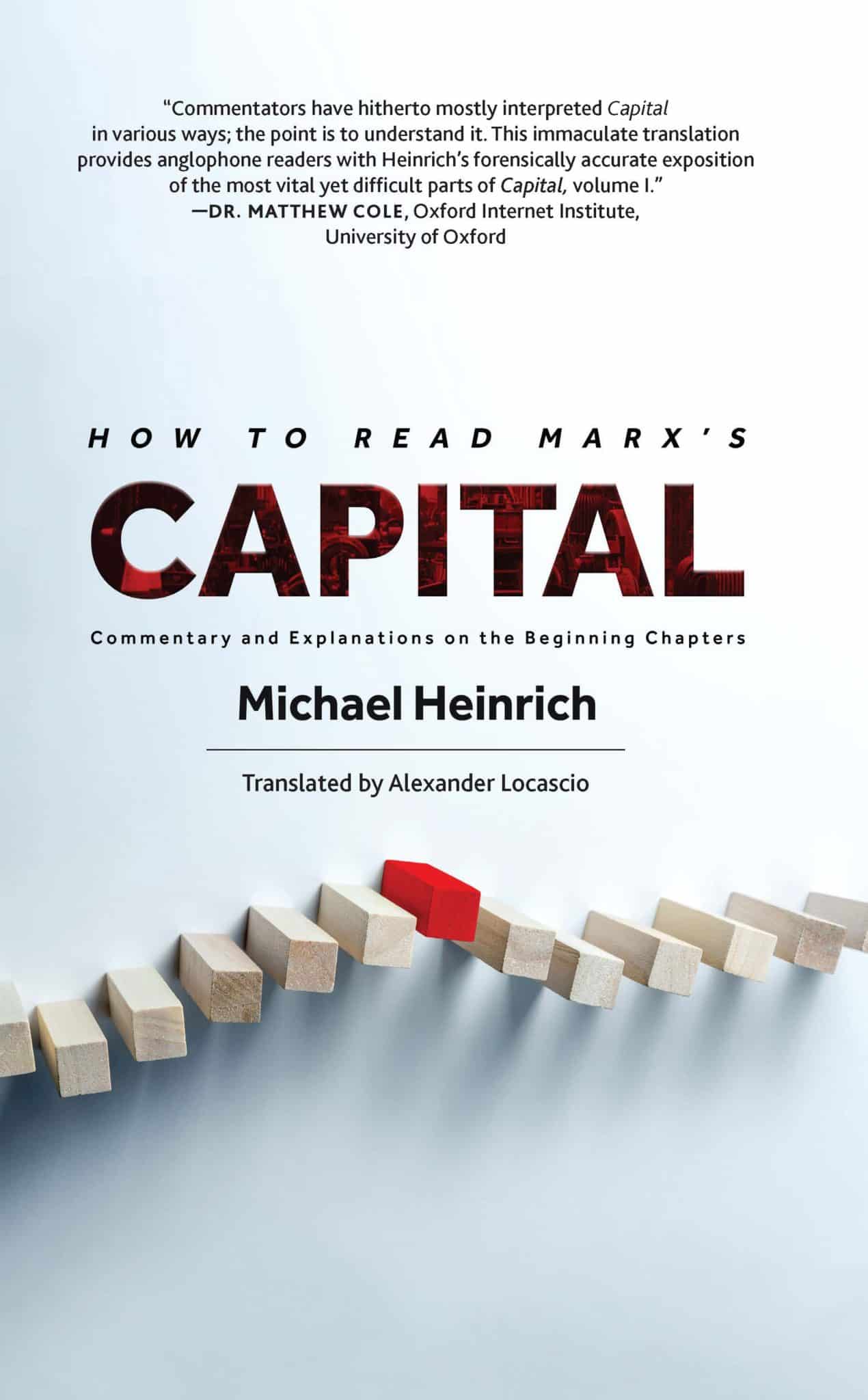How to Read Marx’s ‘Capital’: Commentary and Explanations on the Beginning Chapters
$16.00 – $89.00
With the recent revival of Karl Marx’s theory, a general interest in reading Capital has also increased. But Capital—Marx’s foundational nineteenth-century work on political economy—is by no means considered an easily understood text. Central concepts, such as abstract labor, the value-form, or the fetishism of commodities, can seem opaque to us as first-time readers, and the prospect of comprehending Marx’s thought can be truly daunting. Until, that is, we pick up Michael Heinrich’s How to Read Marx’s ‘Capital’.
Paragraph by paragraph, Heinrich provides extensive commentary and lucid explanations of questions and quandaries that arise when encountering Marx’s original text. Suddenly, such seemingly gnarly chapters as “The Labor Process and the Valorization Process” and “Money or the Circulation of Capital” become refreshingly clear, as Heinrich explains just what we need to keep in mind when reading such a complex text. Deploying multiple appendices referring to other pertinent writings by Marx, Heinrich reveals what is relevant about Capital, and why we need to engage with it today. How to Read Marx’s ‘Capital’ provides an illuminating and indispensable guide to sorting through the cultural detritus of a world whose political and economic systems are simultaneously imploding and exploding.
Most of our perennial debates would be obviated by a shared understanding of the first chapters of Capital—and after the publication of How to Read Marx’s ‘Capital’, you have no excuse. With his characteristic combination of a mathematician’s precision and a philologist’s erudition, Heinrich disassembles the intricate clockwork of Marx’s Capital into its component pieces, and gives the reader just as much as she needs to put them back together again. It is at once so embedded in the text Heinrich quite rightly deems it a ‘workbook’, and a work of magisterial historical-critical scholarship rendering Marx’s debt to Aristotle as lucidly as Ricardo. Heinrich does not offer an interpretation of Marx so much as astrally project the reader into the mind of Karl in his self-critical process of deliberately constructing the delicate argumentation of Capital. The genius of Heinrich’s commentary, like that of Capital itself, is that it makes the reader herself a scholar.
-Cordelia Belton, author of forthcoming book on communism
In this explosive new commentary written by the world’s leading scholar on Marx, Michael Heinrich brings a rejuvenating fire to the important task of reading Capital, dispensing with obsolete interpretations while highlighting underrecognized problems. By clarifying the stakes of Marx’s critique of political economy and arguing for its contemporary relevance, Heinrich leaves us with a project which is open-ended and politically serious. Both new students and long-time teachers of Marx will benefit immensely from this text, as nothing of this depth has ever been available in English until now.
—Edward “Edwad” Henry, co-host of Reel Abstractions podcast
Commentators have hitherto mostly interpreted Capital in various ways; the point is to understand it. This immaculate translation provides anglophone readers with Michael Heinrich’s forensically accurate exposition of the most vital yet difficult parts of Capital: Volume 1.
—Dr Matthew Cole, Oxford Internet Institute, University of Oxford
This fine book by one of the foremost living Marx scholars equips readers to better draw on Marx’s writing in the way Marx would have wanted – as a body of ideas to help us think for ourselves. With accessible prose and conceptual rigor, How to Read Marx’s ‘Capital’ clarifies Marx’s masterwork, without sacrificing either nuance or complexity. Heinrich’s book will help readers new and old to better understand Capital and thus capitalism’s ongoing generation of human misery. The book makes a major contribution to today’s exciting renewal of Marxist inquiry.
—Nate Holdren, author of Injury Impoverished and associate professor in Drake University’s Program in Law, Politics, and Society
Michael Heinrich taught economics for many years at the University of Applied Sciences in Berlin and was managing editor of PROKLA: Journal for Critical Social Science. He has written in depth on Marx’s critique of political economy in his book, The Science of Value. His An Introduction to the Three Volumes of Karl Marx’s “Capital” is probably the most popular introduction to Marx’s economic works in Germany. His Karl Marx and the Birth of Modern Society (Vol. I) has attracted consistent praise.
Alexander Locascio, translator of this book from German to English, has been active in the U.S. labor movement. His other translations include An Introduction to the Three Volumes of Karl Marx’s Capital, Thomas Piketty’s Capital in the Twenty-First Century: An Introduction, and Karl Marx and the Birth of Modern Society. He lives in Berlin with his family.
For excerpts and a discussion of the book, head here.
Publication Date: August 2021
Number of Pages: 448
Paperback ISBN: 978-1-58367-894-7
Cloth ISBN: 978-1-58367-895-4
eBook ISBN: 978-1-58367-896-1
Related products
-
Monthly Review Volume 2, Number 4 (August 1950) [PDF]
$10.00 Add to cart -
Monthly Review Volume 2, Number 3 (July 1950) [PDF]
$10.00 Add to cart -
Monthly Review Volume 1, Number 6 (October 1949) [PDF]
$10.00 Add to cart -
Monthly Review Volume 1, Number 4 (August 1949) [PDF]
$10.00 Add to cart -
Monthly Review Volume 1, Number 2 (June 1949) [PDF]
$10.00 Add to cart -
Imperialism and World Economy
$15.00 Select options This product has multiple variants. The options may be chosen on the product page

![Monthly Review Volume 2, Number 4 (August 1950) [PDF]](https://monthlyreview.org/wp-content/uploads/2015/09/Monthly Review Volume 2, Number 4 (August 1950) [PDF].jpg)
![Monthly Review Volume 2, Number 3 (July 1950) [PDF]](https://monthlyreview.org/wp-content/uploads/2015/09/Monthly Review Volume 2, Number 3 (July 1950) [PDF].jpg)
![Monthly Review Volume 1, Number 6 (October 1949) [PDF]](https://monthlyreview.org/wp-content/uploads/2015/09/Monthly Review Volume 1, Number 6 (October 1949) [PDF].jpg)
![Monthly Review Volume 1, Number 4 (August 1949) [PDF]](https://monthlyreview.org/wp-content/uploads/2015/09/Monthly Review Volume 1, Number 4 (August 1949) [PDF].jpg)
![Monthly Review Volume 1, Number 2 (June 1949) [PDF]](https://monthlyreview.org/wp-content/uploads/2015/09/Monthly Review Volume 1, Number 2 (June 1949) [PDF].jpg)
